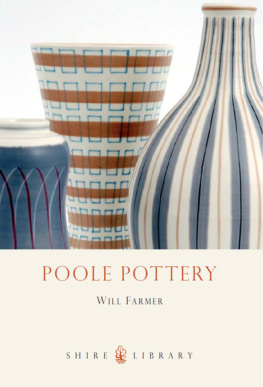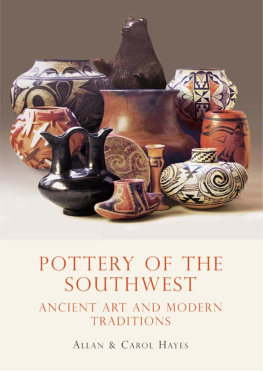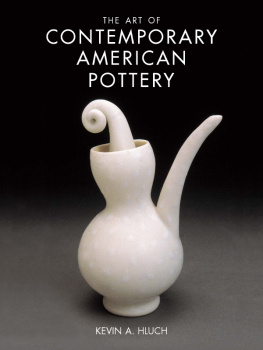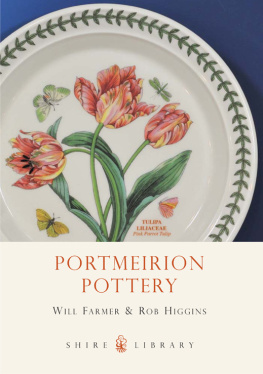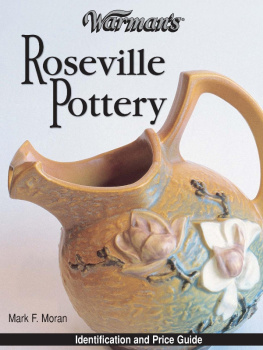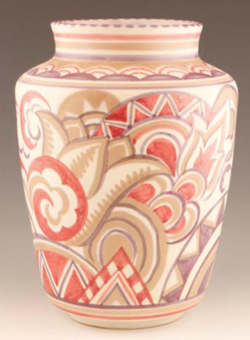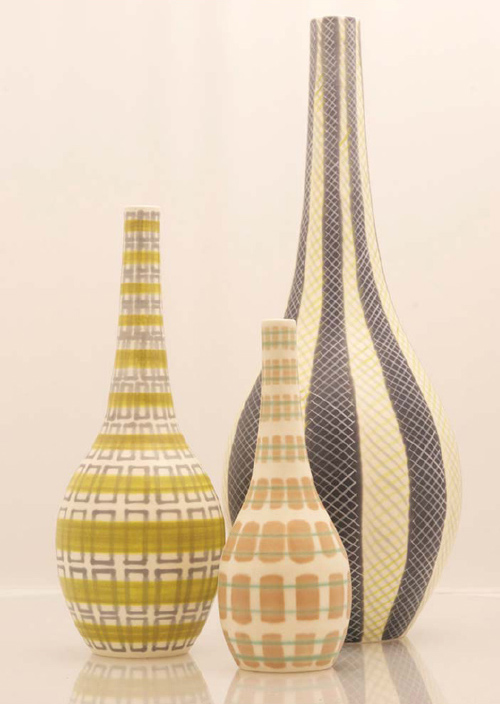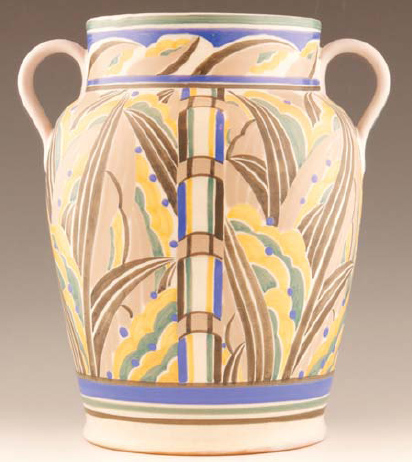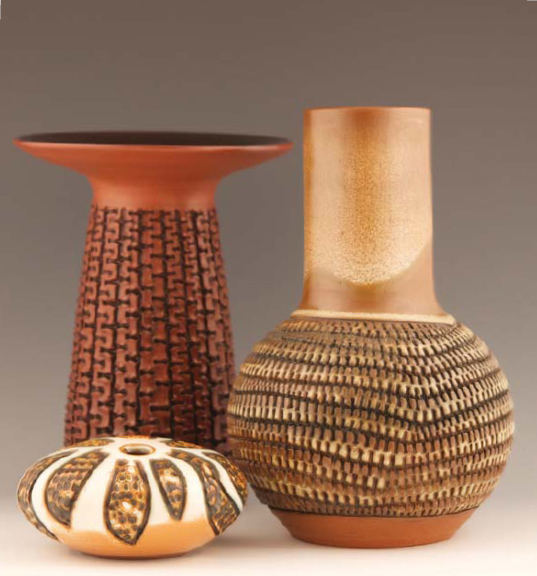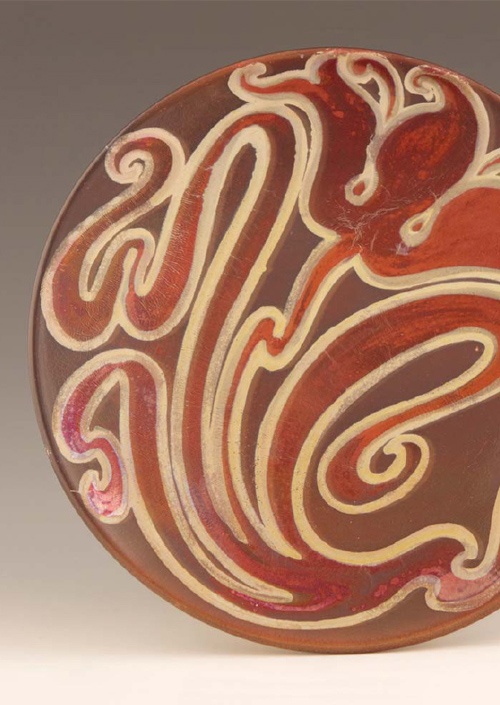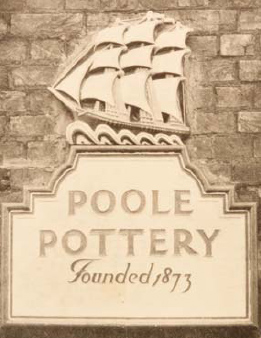POOLE POTTERY
Will Farmer
SHIRE PUBLICATIONS
CONTENTS
INTRODUCTION
A group of Freeform range wares after designs by Alfred Read and Guy Sydenham, c. 19547.
P OOLE POTTERY is recognised as among the most important, distinctive and enthusiastically collected pottery of the twentieth century. Over its long history the company has moved effortlessly through changes in taste and style with an almost chameleon-like approach to design. Steeped in history, Poole Pottery is renowned throughout the world for producing innovative and versatile domestic ceramics that have withstood the test of time, while playing host to some of the most distinguished designers of the twentieth century. From its strong foundations in the nineteenth centurys industrial and social revolution, Poole Pottery has created a huge array of decorative wares, from the myriad of utilitarian and decorative tiles to bright and bold hollow wares.
While most major pottery manufacturers were located in the heartlands of Staffordshire, Poole Pottery, originally based in Dorset, grew from a combination of natural raw materials, inspired management, talented designers and skilled craftsmen. Its location, miles away from the suffocating smoke and competition of the Potteries, allowed for a relaxed freedom that would be translated onto the surface of the pottery it so beautifully crafted.
Over the years Poole Pottery has drawn inspiration from many historical styles and cultures and experimented with countless decorative processes and techniques to produce a vast body of work which has created a large and dedicated following of collectors. Arts & Crafts, Traditional, Freeform, Studio, Delphis, Atlantis; the list of ranges of ware goes on, establishing decades of inspired designs and creating a fondness and respect among collectors around the world.
The acute awareness of the wider world around them has allowed Poole Pottery to remain at the forefront of commercial design. Like a generational timeline, the company has undergone many changes in style which, while dramatically different, are unified by their quality. For many years the beating heart of the company was the design and manufacture of tiles. However, the experimentation with art wares at the turn of the century marked a new direction for Poole Pottery which would see them confidently through the twentieth century.
Original artwork by Truda Carter, c. 1930.
A shape 437 vase in BD pattern after designs by Truda Carter, c. 1930.
From the fluid and lustrous wares of the Arts & Crafts period to the inspired Living Glaze range, Poole Pottery has repeatedly placed itself at the heart of commercial ceramic manufacture with a philosophy that owes a great deal to the studio pottery movement.
In recent years the company has fallen on somewhat troubled times with financial issues, closures and takeovers. Today there seems to be a glimmer of hope that it can move into the twenty-first century with new vigour, new owners and new designs, which will sit happily alongside the truly magnificent body of work from the previous hundred years.
A small group of Atlantis wares after designs by Guy Sydenham, c. 19724.
EARLY BEGINNINGS CARTER & COMPANY
A circular plaque with lustre floral decoration, c. 190018.
F OR CENTURIES the area around Poole has been inextricably linked with the production of ceramics, owing to the massive natural deposits of various types of clay. Since the eighteenth century the fine clay of the region has been exported to the Potteries and beyond, to provide the raw materials for the production of fine quality domestic wares.
From small craft concerns to larger, more significant businesses, there has been a long tradition of manufacture in a region keen to make use of the areas natural resources. The development of a more significant pottery in Poole arose from the increasing demands of a rapidly developing nation during the Industrial Revolution. The increasing wealth of the middle and upper-middle classes was demonstrated through their homes, with decoration and interior design used as visual displays of social status. From chimney breast to hall and from rooftop to garden, the design and decoration of a home was an outward presentation of a familys wealth and success.
The natural bed of dark clays in the area north of Poole was found to be ideal material for the manufacture of architectural ceramics such as bricks, tiles, drain pipes and so on. Among the many companies in the region formed to address the needs of the nation, one of the grandest was that of James Walker. Established in 1861, the company proudly traded as T. W. Walkers Patent Encaustic and Mosaic Ornamental Brick and Tile Manufactory. Such a grand title promised great hope! However, the reality was somewhat different from the ambition. Despite the huge demand for decorative building materials and ceramics, James Walker found himself in a precarious financial position on more than one occasion. We can only assume that Walker was possibly not the most accomplished businessman, as during the 1860s both his stock and business were offered for sale at public auction twice. Eventually, in 1873, Walker was declared bankrupt and the works, housed in a large three-storey building were closed.
Jesse Carter, a successful builders merchant and ironmonger based in Weybridge, Surrey, would have more than likely been aware of Walkers business and its wide range of fashionable products. In 1873, only a few months after Walkers declared bankruptcy and the companys closure, Carter purchased the company, buildings and existing stock. Aware of the growing trend for Walkers products and seeing the possibilities that lay in the acquisition, Carter moved his wife and six children to Poole, taking up residence at Percy House, 20 Market Place.
A Poole Pottery wall plaque formerly attached to the factory, c. 1925.

